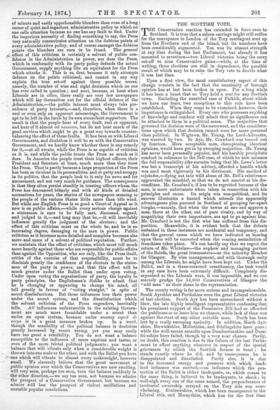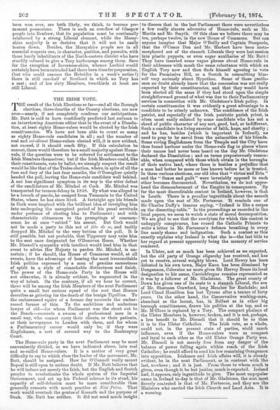THE SCOTTISH VOTE.
THE Conservative reaction has extended in force even to
Scotland. It is true that a saloon carriage might still suffice for the conveyance to London of the Tory contingent sent up from the Northern end of the island, but its numbers have been considerably augmented. Ten was its utmost strength at any time during the last Parliament, but already it has mounted to seventeen—two Liberal victories being the sorry set-off to nine Conservative gains—while, at the time of writing, three elections are still in dependence, the possible result of which may be to raise the Tory vote to double what it was last time.
Upon a first view, the most unsatisfactory aspect of this change consists in the fact that the unanimity of borough opinion has at last been broken in upon. For a long while it has been a boast that no Tory held a seat for any Scottish town. Excluding the unsettled case of Falkirk, about which we have our fears, two exceptions to this rule have been established. When they come to be examined, however, their importance is extinguished. Every one who possesses anything of knowledge and candour will admit that no significance can be attached to them in a political sense. The majorities that governed the decision were of the narrowest, and the considera- tions upon which that decision turned were far more personal than political. In Wigtown, Mr. Young, the Lord-Advocate, was worsted by two. In Ayr, Mr. Crawfurd was turned out by fourteen. More acceptable men, championing identical opinions, would have got in by sweeping majorities. Mr. Young has never been personally popular, and his harshly precipitate conduct in reference to the Bell case, of which be now assumes the full responsibility (the surmise being that Mr. Lowe's letter was but a transcript of his advice), afforded a handle which was used most vigorously to his detriment. His method of rejoinder,—flying out into wild abuse of Mr. Bell's relatives— aggravated the mischief, so that we do not marvel at his dis- comfiture. Mr. Craufurd's, if less to be regretted because of the man, is more unfortunate when taken in connection with his principles and cause. Its origin wis non-political, and its success illustrates a hazard which attends the apparently advantageous plan pursued in Scotland of grouping far-apart burghs,—namely, that when the towns at one end approve a man, those at the other, out of pure rivalry, and by way of magnifying their own importance, are apt to go against him. Mr. Craufurd is not the first who has suffered from this dis- position. Meanwhile, it is evident both that the defeats sustained in these instances are accidental and temporary, and that the general cause which we have indicated as bearing upon them will be corrected when the coming assimilation of franchises takes place. We can hardly say that we regret the return of Mr. Whitelaw—the nephew and managing partner of the Bairds, the great ironmasters—as the minority Member for Glasgow. By wise management, and with thorough unity among the Liberals, he might have been kept out. Under the Ballot, and in a three-cornered constituency, the task would in any case have been extremely difficult. Completely dis- organised as the Liberals were, it was impossible, and we can scarcely grudge the 14,000 Conservatives of Glasgow the "odd man " as their share in the representation.
The county voting is far more serious and incomprehensible. South Ayrshire and Perthshire were the great Liberal victories of last election. South Ayr has been surrendered without a blow, the late highly intelligent representative confessing that his prominent support of the Permissive Bill had so offended the publicans as to leave him no chance, while lack of time was against the start of any other suitable man, Perth has been lost by a really sweeping majority. In addition, North Ayr- shire, Berwickshire, Midlothian, and Stirlingshire have gone ; while the well-meant assaults upon Dumbartonshire and Dum- friesshire have failed, though by a very near chance. Partly, no doubt, this reaction is due to the failure of the last Parlia- ment to effect anything whatever in respect of the special grievances by which the Scottish farmer is beset ; he stands exactly where he did, and by consequence he is disappointed and dissatisfied. Partly also, it is due to the increased energy and pressure with which land- lord influence was exerted,—an influence which the pro- tection of the Ballot is either inadequate, or, which comes to the same thing, is believed to be inadequate, to check ; in well-nigh every one of the cases named, the preponderance of territorial ownership arrayed on the Tory side was over- whelming. Renfrewshire, which has been reconquered to the Liberal side, and Morayshire, which has for the first time
been won over, are both likely, we think, to become per- manent possessions. There is such an overflow of Glasgow people into Renfrew, that its population must be continually reinforced by a strong Liberal element, while the Moray- shire majority is so decisive that it will not be easily beaten down. Besides, the Morayshire people are in all essential respects one, in character, position, and pursuits, with those hardy inhabitants of the North-eastern district who have sturdily refused to give a Tory harbourage among them. Save for the exception of Inverness-shire, whence Lochiel would certainly have been extruded had there been time for preparation, (but who could canvass the Hebrides in a week's notice ?) there is still one-half of Scotland in which no Tory has a seat ; and of her sixty Members, two-thirds at least are still Liberal.



































 Previous page
Previous page